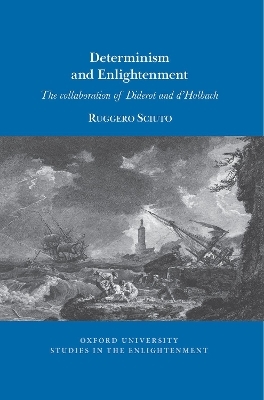
Determinism and Enlightenment
Voltaire Foundation (Verlag)
978-1-80207-767-4 (ISBN)
Ruggero Sciuto is a Leverhulme Early Career Researcher at St Edmund Hall, Oxford, where his research focuses on eighteenth-century French literature and philosophy as well as on early modern diplomacy. He is the director of Digital d’Holbach, a born-digital critical edition of d’Holbach’s works, and a collaborator on the Oxford edition of Voltaire’s Complete Works.
List of Abbreviations
List of figures
Acknowledgments
Introduction
1: One question, two thinkers
1.1: Determinism
1.2: Diderot
1.3: D’Holbach
2: Linking everything together
2.1: Diderot and d’Holbach
2.2: D’Holbach and determinism
2.3: Diderot and determinism
3: Synopsis
3.1: Building blocks
3.2: Of Individuals and Societies
3.3: Determinism, complexity, and atheism
4: Further aims of this book
5: N.B.
5.1: Determinism vs fatalism
5.2: Corpora and chronology
Chapter I: Three Fundamental Principles
1: Background
1.1: The Causal Principle
1.2: The Causal Principle under attack
1.3: The Principle of Sufficient Reason
1.4: Causal Principle, Principle of Sufficient Reason, and Cosmological Argument
1.5: Hume’s criticisms of the Cosmological Argument
1.6: The Nihil ex Nihilo Principle
2: Diderot and d’Holbach
2.1: Diderot, d’Holbach, and the Nihil ex Nihilo Principle
2.2: Diderot, d’Holbach, and the Causal Principle
2.3: For the sake of determinism and science
2.4: Diderot, d’Holbach, and the Principle of Sufficient Reason
2.5: Causa sive ratio
2.6: Cause and reason in Diderot’s and d’Holbach’s writings
2.7: Why do Diderot and d’Holbach endorse the Principle of Sufficient Reason?
3: Conclusion
Chapter II: Causal Necessitation
1: Background
1.1: Causal Necessitation
1.2: Causal and Logical Necessitation
1.3: The argument from essence
1.4: The argument from total cause
1.5: No Necessary Connection Arguments
2: Diderot and d’Holbach on Causal Necessitation
2.1: Suites et effets nécessaires
2.2: Additional evidence
2.3: Causal Necessitation in the moral world
2.4: Diderot and d’Holbach on the equivalence of Causal and Logical Necessitation
2.5: D’Holbach and the argument from essence
2.6: Diderot: the argument from essence and the argument from ‘cause une’
3: Causal Necessitation and theology
3.1: The reasons behind it all
4: Conclusion
Chapter III: Laws of Nature
1: Background
1.1: Laws of nature in eighteenth-century France
1.2: The Top-Down View
1.3: The Bottom-Up View
1.4: Spinoza
2: D’Holbach and the laws of nature
2.1: D’Holbach and the Bottom-Up View
2.2: D’Holbach and the Top-Down View
2.3: D’Holbach’s compromise
3: Diderot and the laws of nature
3.1: Two arguments against Diderot’s belief in the laws of nature
3.2: A glance at the texts
3.3: Diderot and mathematics
3.4: Diderot and the Bottom-Up View
4: Conclusion
Chapter IV: Moral Freedom
1: Background
1.1: ‘Liberté naturelle’, ‘liberté civile’, and ‘liberté politique’
1.2: Moral freedom
1.3: The Alternative Possibilities Model
1.4: The Source Model
1.5: Moral Freedom and determinism
2: Diderot and d’Holbach on Moral Freedom
2.1: Diderot and d’Holbach on the Source Model
2.2: Internal and external causes
2.3: External causes
2.4: Internal causes
2.5: Internal and external causes reconsidered
2.6: Diderot and d’Holbach on the Alternative Possibilities Model
2.7: Outright rejection of Moral Freedom
2.8: Moral responsibility
3: Conclusion
Chapter V: Individuals and Society
1: A deterministic theory of human life
1.1: Machines de chair
1.2: Pensées décousues
1.2: Dreaming
1.3: Madness
1.4: Scientific discoveries
1.5: Artistic production
1.6: Aesthetic experience
2: No man is an island
2.1: Love
2.2: Machines d’hommes
2.3: Causal Necessitation and Laws of Nature
2.4: Of climate and rulers
2.5: Social change in a deterministic world
Conclusion
Chapter VI: Paradoxes of Determinism
1: Determinism and complexity
1.1: Diderot and complexity
1.2: D’Holbach and complexity
1.3: Against the Argument from Design
1.4: Determinism vs complexity
1.5: A complex theory of determinism
2: Of Predictability, chance, (dis)order, and atheism
2.1: Determinism and predictability
2.2: Determinism and chance
2.3: Determinism or (dis)order
2.4: Diderot and d’Holbach’s atheism reconsidered
3. Jacques le fataliste et son maître
3.1: Les chainons, le grand rouleau, et le dieu de Malebranche
3.2: The mirage of freedom and the Leibnizian God
3.3: Jacques, Hume, and superstition
Conclusion
Conclusion
Bibliography
Pre-1850 sources
Post-1850 sources
| Erscheinungsdatum | 13.04.2023 |
|---|---|
| Reihe/Serie | Oxford University Studies in the Enlightenment ; 2023:04 |
| Zusatzinfo | Illustrations, black and white |
| Verlagsort | Liverpool |
| Sprache | englisch |
| Maße | 156 x 234 mm |
| Themenwelt | Geisteswissenschaften ► Philosophie ► Philosophie der Neuzeit |
| Geisteswissenschaften ► Sprach- / Literaturwissenschaft ► Anglistik / Amerikanistik | |
| Geisteswissenschaften ► Sprach- / Literaturwissenschaft ► Literaturwissenschaft | |
| Sozialwissenschaften | |
| ISBN-10 | 1-80207-767-7 / 1802077677 |
| ISBN-13 | 978-1-80207-767-4 / 9781802077674 |
| Zustand | Neuware |
| Haben Sie eine Frage zum Produkt? |
aus dem Bereich


